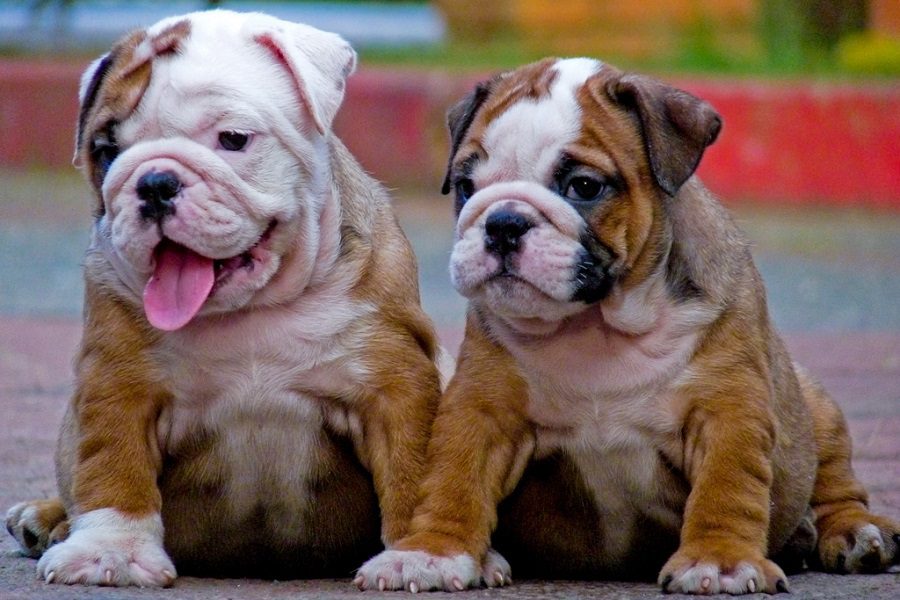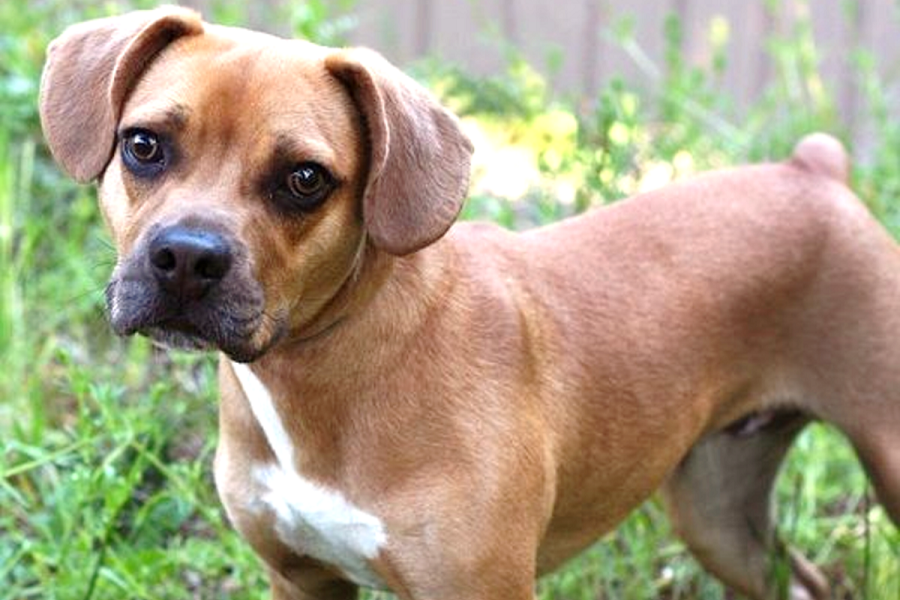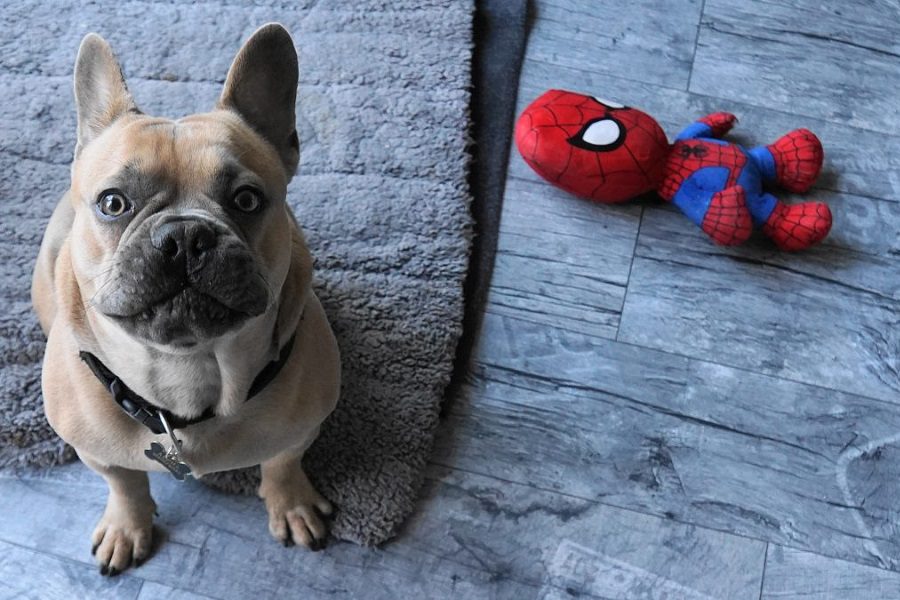Last Updated: 1 year ago
The Bulldog was originally used for driving cattle to market and for competing in a bloody sport that was referred to as bullbaiting.
Today, their role has changed significantly. They are gentle companions who love to be around people and kids.
The modern Bulldog is descended from an ancient type of mastiff dog. It was a breed that was developed entirely in England, with the first mentions begin back in the 1500s.
The original bulldogs were much taller and heavier than the modern versions and they were used in bull baiting, as mentioned before.
After bullbaiting was outlawed in England, many believed that the bulldog would go away since they no longer served a purpose. This is especially true since, at this period of time, the bulldog was not considered to be either affectionate or a good companion.
Even despite all the negative thoughts of this dog, the bulldog was admired for its persistence, strength, and stamina. As a result, the bulldog was re-engineered a bit.
Patient and dedicated breeders began to select the dogs that just had a docile temperament for breeding purposes. Thanks to the focus of the breeders, the Bulldog was transformed into an affectionate and gentle dog, which is well-known today.
Learning a bit more about the bulldog will help you determine if this is the right one for you and your family. Take some time to review the information here to learn if the bulldog will make the right addition to your family.
They can be wonderful companions, but being informed is essential when it comes to having a happy and healthy bulldog.
Common Characteristics of the Bulldog
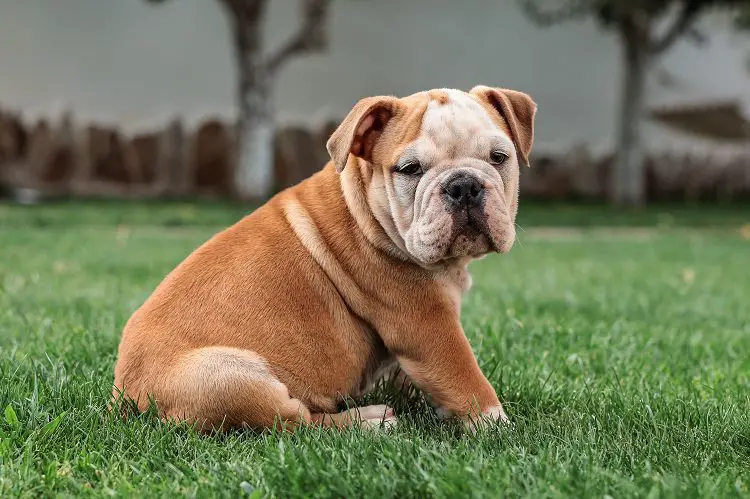
Bulldogs are considered to be extremely special and different from other types of dog breeds. Some of the qualities that help this breed of dog to stand out are their legendary patience with children and they’re calm and quiet behavior.
The primary drawbacks that are present with this breed are that they are short-lived when compared to another type of dog breeds, but, this is a factor that is highly dependent on the dog’s living conditions, their diet, health and, of course, genetics.
The bulldog has a quite temper and they only bark when there is a good reason to do so. They don’t need much exercise, which makes them a great city dog.
Due to owners being extremely intrigued by their bulldogs antics, they often don’t invest much time in obedience training. As the puppy grows; however, it is a good idea to give them a bit of training.
Even though the bulldog has a tolerant and sweet character, their appearance is usually a deterrent to a would-be intruder.
While a bulldog does not obtain a high score in regard to being a security or watchdog, compared to other breeds, they can be quite ferocious in their appearance.
Bulldog Health Issues

The bulldog can suffer from a number health issues. For example, even though they have a short face, every Bulldog will suffer from some type of brachycephalic syndrome, which can result in a number of different health issues.
The respiratory system of this dog is often so compromised that there are some bulldogs that are unable to run without having to gasp for breath.
There are some that struggle to breathe when it is humid or hot out. When summer comes, it is important to keep the bulldog in an air conditioned home and ensure they do not become overexerted, which could lead to heatstroke.
Almost all bulldog puppies have to be born via c-section and there is a high level of birth defects. The mortality rate of puppies is also high.
This breed of dog can also suffer from orthopedic deformities. The abnormal build of the bulldog can create a structural defect, which is referred to as chondrodysplasia, which means they are predisposed to joint and bond problems. Another common issue is hip dysplasia.
In fact, according to the Orthopedic Foundation of America, about 74 percent of all bulldogs are dysplastic.
Other health issues that bulldogs face include:
- Intervertebral disk disease
- Hemivertebra
- Cruciate ligament rupture
- Hypothyroidism
- Heart disease
- Skin allergies
- Demodectic mange
- Tumors
- Eye issues
Bulldog Size
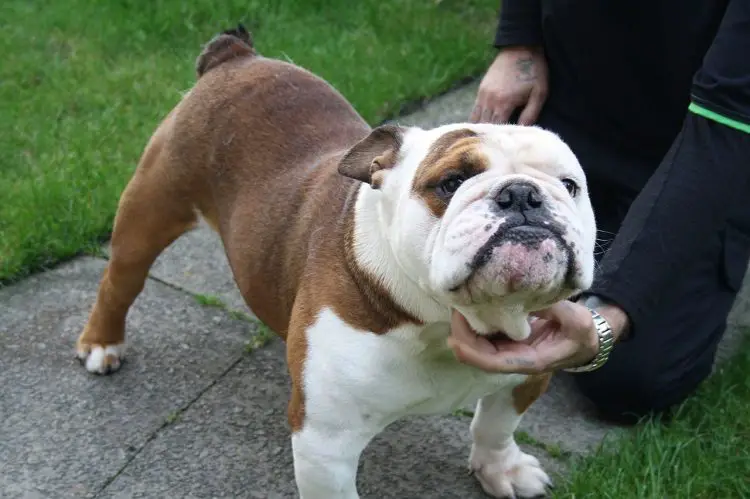
The size of the bulldog varies based on the gender. They are considered a small dog and do not get extremely large.
For example, a mature male bulldog will weigh around 50 pounds when full-grown and females will weigh about 40 pounds.
If the bulldog is going to be a show dog, they may weigh around 10 pounds more. Both males and females will stand about 12 to 15 inches tall at the shoulder.
Personality Traits
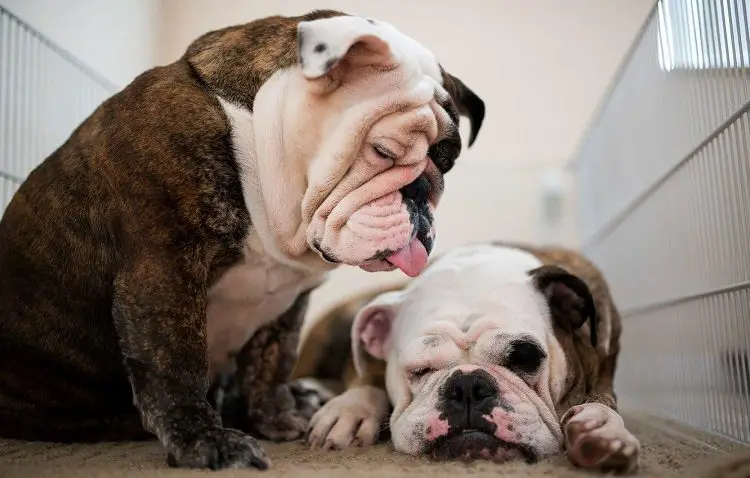
The bulldog is both sweet and sociable. They have a reputation for being courageous and that makes them an excellent watchdog.
The bulldog is more of a lover, rather than a fighter. In fact, they are dignified, instead of lively and at times, quite stubborn.
The Bulldog is both easygoing and friendly and well-known for getting along with people and other dogs.
They are often slow learners, but once they catch on to something new, they will be able to do it for good. Most bulldogs do not bark much, and their appearance alone will frighten off a would-be intruder.
Care Instructions
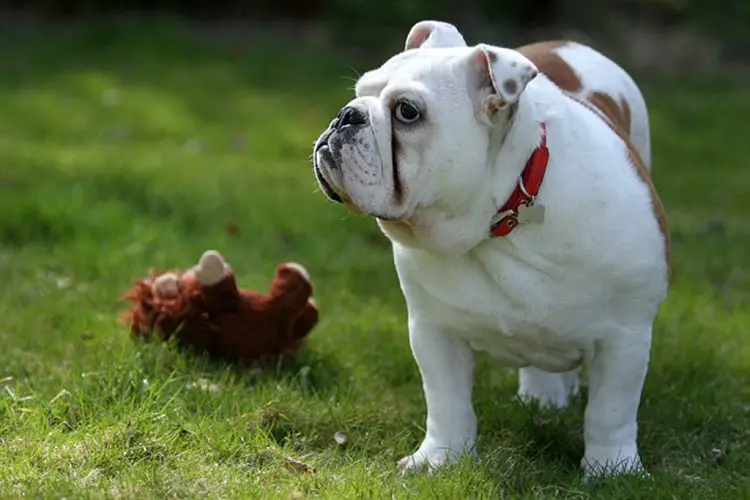
The fact is, caring for a bulldog is often very different than caring for other types or breeds of dog. While the saying “they’re so ugly they cure” definitely applies, there are other factors to consider, as well.
In fact, bulldogs smell, quite a bit and they drink quite a bit of water and will trail it throughout the house. They will chew and lick everything, but these are some of the traits that make the bulldog unique.
Some care tips for the bulldog include:
- Feed them regularly in the morning and at night. There are some bulldogs that will require a special type of food to help and prevent allergies.
- They should receive some type of light exercise one time a day.
- Their face needs to be cleaned on a daily basis to prevent issues with fold dermatitis.
- They should go to the vet on a regular basis.
- Provide them with a comfortable and soft place to sleep – as this is where they will be happiest.
In addition to providing proper general care, it is a good idea to also socialize the bulldog. On cool days, consider going to the dog park and letting your bulldog interact with other dogs.
Doing this will teach them to be sweet and approachable dogs. Be sure to begin socializing your bulldog as a puppy, since this will be when they are most open to this type of interaction.
As they grow up they may become more “set in their ways,” and even stubborn when it comes to interacting with other dogs and people.
Common Coat Colors
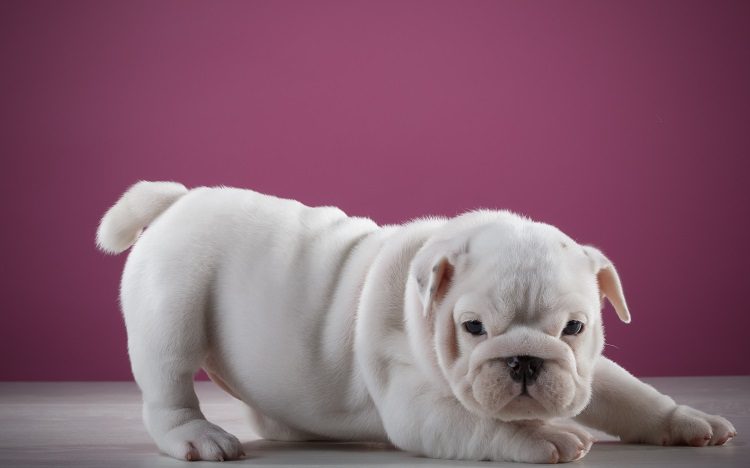
Bulldogs have all different colors of coats. The coat color should be uniform, pure and brilliant. The preferences of coat colors for the bulldog include:
- Red brindle
- Solid white
- Other brindles
- Solid fallow, fawn or red
- Piebald
It is important to note, if you are getting a bulldog for show, a perfect piebald will be preferable to any defective solid color or muddy brindle. Another undesirable color is solid black, but not as objectionable if it occurs in a moderate degree in the piebald patches.
The brindles are considered perfect when they have an equal, even and fine disruption of all the composite colors. In both solid colors and brindles, a factor that is not considered to be detrimental is having a small white patch on the chest.
Temperament

The temperament of the bulldog can be affected by a number of different factors, which include their socialization, training, and heredity. The puppies that have a good temperament are usually playful and curious.
They will approach people willingly and be willing to be held. It is a good idea to find a middle of the road puppy, rather than one that is hiding in the corner or beating up other puppies in its litter.
This will help ensure you get a puppy that will make a friendly older dog. It may also be a good idea to meet one of the puppy’s parents, or both if possible. These are all good indications of what the puppy will be like when they grow up.
Conclusion
Bulldogs are a unique and fun breed that can be used as show dogs or companions.
However, the bulldog does have a number of health issues that it is prone too, so it is essential to make sure you are up to caring for a dog when they are facing these types of health concerns.
Being fully informed about the type of dog you are interested in will help you determine whether the bulldog is right for you. Bulldogs are great companions and offer a cute, somewhat ugly, face to look at.

